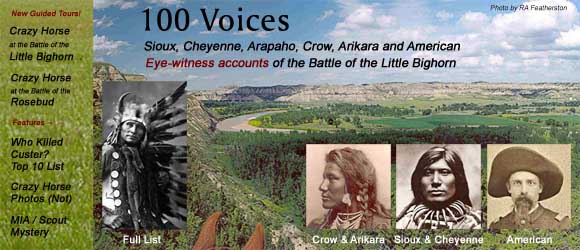
This is a FREE EXCERPT from
Bruce Brown's 100 Voices...
Charles DeRudio's Story of the Battle
A 7th Cavalry survivor's account of the Battle of the Little Bighorn
|
From the New York Herald, July 30, 1876.
|
Note |
LIEUTENANT CHARLES DeRUDIO'S LETTER
Camp on N. side Yellowstone, July 5, '76
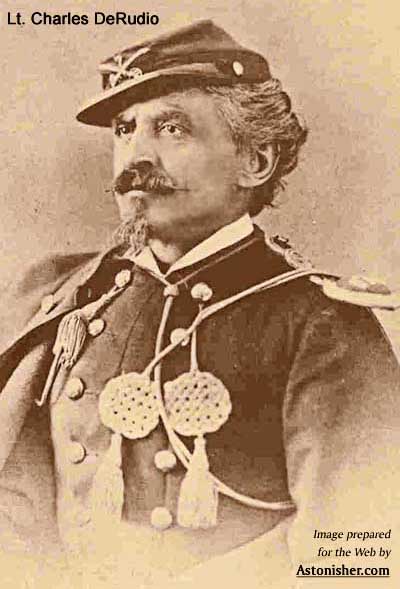 I HAD A NARROW escape at the battle of the Little Bighorn on the 25 & 26 of June and I will endeavor to give you my experience of Indian fighting. At about 10 A.M. on the 25th June, Gen. Custer's scouts returned and reported that they had discovered an Indian village about 15 miles distant, on the Little Bighorn, and that from what they had seen, they supposed the Indians to be retreating before our advance. We continued our march two or three miles farther when a halt was ordered and Gen. Custer began preparations for attacking the. enemy. He detailed Co's. H, D & K, under the command of Col. F. W. Benteen to take the left of our route, with orders, so I hear, to sweep everything in his way: Co's. M, A, & G were put under the command of Col. Reno; and being temporarily attached to Co. A, I found myself with this division. Gen. Custer took Co's. E, I, F, L & C, and occupied the right of the line of attack. The remaining Company, B, was left to guard the packtrain. After marching two or three miles, our command, the center, was ordered to trot and hold the gait until we reached the river, six or seven miles distant. Having reached the river, we forded, and on reaching the plain beyond the opposite bank, we were ordered into line of battle. I HAD A NARROW escape at the battle of the Little Bighorn on the 25 & 26 of June and I will endeavor to give you my experience of Indian fighting. At about 10 A.M. on the 25th June, Gen. Custer's scouts returned and reported that they had discovered an Indian village about 15 miles distant, on the Little Bighorn, and that from what they had seen, they supposed the Indians to be retreating before our advance. We continued our march two or three miles farther when a halt was ordered and Gen. Custer began preparations for attacking the. enemy. He detailed Co's. H, D & K, under the command of Col. F. W. Benteen to take the left of our route, with orders, so I hear, to sweep everything in his way: Co's. M, A, & G were put under the command of Col. Reno; and being temporarily attached to Co. A, I found myself with this division. Gen. Custer took Co's. E, I, F, L & C, and occupied the right of the line of attack. The remaining Company, B, was left to guard the packtrain. After marching two or three miles, our command, the center, was ordered to trot and hold the gait until we reached the river, six or seven miles distant. Having reached the river, we forded, and on reaching the plain beyond the opposite bank, we were ordered into line of battle.
Everything being as was ordered, we started on a gallop and for two miles pursued on the verge of an immense and blinding cloud of dust raised by the madly flying savages ahead of us. The dust cloud was so dense that we could distinguished nothing, so Col. Reno halted the battalion and after dismounting, formed a skirmish line-the right flank resting on the edge of a dry thickly wooded creek. While the horses were being led to shelter in the wood, the Indians opened a galling fire on us which was immediately responded to, the skirmish continuing for about one-half hour. It was now discovered that on the other side of the creek, in a park-like clearing, there were a few lodges, and the whole line crossed the creek to find the lodges deserted, and be received by about two hundred yelping, yelling redskins. The fire from the numerically superior force necessitated a retreat which was almost impossible, as we were now surrounded by warriors. When we entered the engagement we were only 100 strong and the fire of the enemy had made havoc in our little band. When we were half way over the creek, I, being in the rear, noticed a guidon planted on the side we had left and returned to take it. When coming through the wood, the guidon entangled itself in the branches and slipped out of my hand. I dismounted to pick it up and led my horse to the south bank of the creek. As I was about to mount, my horse was struck with a bullet, and becoming frightened, he ran into the Indians, leaving me dismounted in the company of about 300 Sioux not more than 50 yards distant. They poured a whistling volley at me, but I was not wounded, and managed to escape to the thicket near by, where I would have an opportunity of defending myself and selling my life at a good high figure. In the thicket I found Mr. Girard [Fred Gerard] , the interpreter; a half-breed Indian; and Private O'Neill [Private Thomas F. O'Neill], of Co. "G", 7th Cav. The first two of the quartet had their horses, while O'Neill like myself, was dismounted. I told the owners of the horses that the presence of the animals would betray us, suggesting at the same time that they be stampeded. They declined to act on the suggestion and I left them and crawled through the thick underwood into the deep dry bottom of the creek, where I could not easily be discovered, and from whence I hoped to be able under cover of darkness to steal out and rejoin the command. I had not been in this hiding place more than 10 minutes when I heard several pistol shots fired in my immediate vicinity, and shortly thereafter came the silvery, but to me diabolical voices of several squaws. I raised my head with great caution to see what the women were at and to discover their exact location. I found the women at the revolting work of scalping a soldier who was perhaps not yet dead. Two of the ladies were cutting away, while two others performed a sort of war dance around the body and its mutilators. I will not attempt to describe to you my feelings at witnessing the disgusting performance. * * * Finally the squaws went away, probably to hunt for more victims and I employed the time thinking of my perilous position.
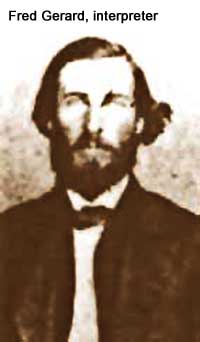 While thus engaged, I heard a crackling noise near me, which upon investigation I found proceeded from burning wood, the Indians having ignited a fire. The wood being very dry, the fire made rapid headway, and I was forced from my hiding place. I crawled out of the creek bottom the same way I had approached, and as I was about-to ascend the bank, I heard a voice calling "Lieutenant, Lieutenant." I could see no one, but the call was repeated, and advancing a few yards in the direction from which it proceeded, I found all three of the party I had left a short time before, hidden in the bottom of the creek. Mr. Girard told me he had left the horses tied together, where I had seen them, and followed down after me. I found that the party, like myself, was afraid of the progress of the fire; but fortunately for us, the wind subsided, and a little rain fell which, thank God, was sufficient to arrest the flames and revive our hope that we might be able to remain there until night. It was now 3 o'clock P.M.: six more hours to wait, and you may imagine how immensely long we found them. During this time we could hear and often see Indians around us and could hear them talk quite near us. I cannot find words sufficiently expressive to describe my many thoughts during those hours of suspense. * * * Finally the time came when under the protection of night (it was very cloudy) we were able to come out of our hiding places and take the direction of the ford, which was two miles to the south, through an open plain. Mr. Girard and the scout mounted their horses and the soldier and myself took hold, each one, of a horses tail, and followed them. Mr. Girard proposed that, in case he should be obliged to run and leave us, and succeeded in joining the command, he would notify Col. Reno the commander, of my position. During our transit through the open plain we passed many Indians returning to their village and could hear but not see them as the night was very dark. We reached the wood near what we took to be the ford we had passed in the morning, but we were mistaken and had to hunt for the crossing. Once we forded the stream but found it was at a bend and that we would have to ford it again. When we recrossed the river, we ran full into a band of eight savages. The two mounted men ran for their lives, the soldier and myself jumped into the bushes near us. I cocked my revolver and in a kneeling position was ready to fire at the savages if they should approach me. They evidently thought, from the precipitate retreat of the two mounted men, that all of us had decamped; and began to talk among themselves. In a few minutes to my surprise they continued their course, and soon after went out of hearing. I raised up from my position,. approached the bank of the river and called to the soldier, who immediately answered. We then saw that all the fords were well guarded by the savages, and it would be very dangerous to attempt to cross any part of the river. * * * The night passed and in the dim dawn of day we heard an immense tramping, as of a large cavalry command, and the splashing of the water convinced us that some troops were crossing the river. I imagined it was our command, as I could distinctly hear the sound of the horses shoes striking the stones. I cautiously stepped to the edge of the bushes to look out (I was then no more than three yards from the bank of the river), and thought I recognized some gray horses mounted by men in military blouses, and some of them in white hats. They were, I thought, going out of the valley, and those that had already crossed the river were going up a very steep bluff, while others were crossing after them. I saw one man with a buckskin jacket, pants, top boots and white hat, and felt quite sure I recognized him as Capt. Tom Custer which convinced me that the cavalrymen were of our command. While thus engaged, I heard a crackling noise near me, which upon investigation I found proceeded from burning wood, the Indians having ignited a fire. The wood being very dry, the fire made rapid headway, and I was forced from my hiding place. I crawled out of the creek bottom the same way I had approached, and as I was about-to ascend the bank, I heard a voice calling "Lieutenant, Lieutenant." I could see no one, but the call was repeated, and advancing a few yards in the direction from which it proceeded, I found all three of the party I had left a short time before, hidden in the bottom of the creek. Mr. Girard told me he had left the horses tied together, where I had seen them, and followed down after me. I found that the party, like myself, was afraid of the progress of the fire; but fortunately for us, the wind subsided, and a little rain fell which, thank God, was sufficient to arrest the flames and revive our hope that we might be able to remain there until night. It was now 3 o'clock P.M.: six more hours to wait, and you may imagine how immensely long we found them. During this time we could hear and often see Indians around us and could hear them talk quite near us. I cannot find words sufficiently expressive to describe my many thoughts during those hours of suspense. * * * Finally the time came when under the protection of night (it was very cloudy) we were able to come out of our hiding places and take the direction of the ford, which was two miles to the south, through an open plain. Mr. Girard and the scout mounted their horses and the soldier and myself took hold, each one, of a horses tail, and followed them. Mr. Girard proposed that, in case he should be obliged to run and leave us, and succeeded in joining the command, he would notify Col. Reno the commander, of my position. During our transit through the open plain we passed many Indians returning to their village and could hear but not see them as the night was very dark. We reached the wood near what we took to be the ford we had passed in the morning, but we were mistaken and had to hunt for the crossing. Once we forded the stream but found it was at a bend and that we would have to ford it again. When we recrossed the river, we ran full into a band of eight savages. The two mounted men ran for their lives, the soldier and myself jumped into the bushes near us. I cocked my revolver and in a kneeling position was ready to fire at the savages if they should approach me. They evidently thought, from the precipitate retreat of the two mounted men, that all of us had decamped; and began to talk among themselves. In a few minutes to my surprise they continued their course, and soon after went out of hearing. I raised up from my position,. approached the bank of the river and called to the soldier, who immediately answered. We then saw that all the fords were well guarded by the savages, and it would be very dangerous to attempt to cross any part of the river. * * * The night passed and in the dim dawn of day we heard an immense tramping, as of a large cavalry command, and the splashing of the water convinced us that some troops were crossing the river. I imagined it was our command, as I could distinctly hear the sound of the horses shoes striking the stones. I cautiously stepped to the edge of the bushes to look out (I was then no more than three yards from the bank of the river), and thought I recognized some gray horses mounted by men in military blouses, and some of them in white hats. They were, I thought, going out of the valley, and those that had already crossed the river were going up a very steep bluff, while others were crossing after them. I saw one man with a buckskin jacket, pants, top boots and white hat, and felt quite sure I recognized him as Capt. Tom Custer which convinced me that the cavalrymen were of our command.
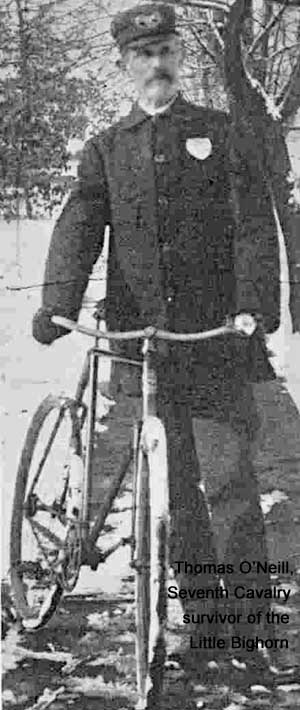 With this conviction I stepped boldly out on the bank and called to Capt. Custer, "Tom, don't leave us here." The distance was only a few yards and my call was answered by an infernal yell and a discharge of 300 or 400 shots. I then discovered my mistake and found the savages were clad in clothes and mounted on horses which they had captured from our men. :Myself and the soldier jumped into the bushes (the bullets mowing down the branches at every volley), and crawled off to get out of range of the fire. In doing so we moved the top branches of the undergrowth, and the Indians on the top of the bluff fired where they saw the commotion and thus covered us with their rifles. [Note: Peter Thompson was also fooled by Indians wearing captured American cavalry uniforms.] We now decided to cross a clearing of about twenty yards and gain another wood; but before doing this, I took the precaution to look out. The prospect was terribly discouraging for on our immediate right, not more than fifty yards distant, I saw four or five Indians galloping toward us. Near by me there were two cottonwood stumps nearly touching each other, and behind this slender barricade myself and the soldier knelt down, he with his carbine and I with my revolver, ready to do for a few of the savages before they could kill us. * * * They had not seen us and when the foremost man was just abreast of me and about ten yards distant, I fired. They came in Indian file, and at my fire they turned a right-about and were making off when Pvt. O'Neill fired his carbine at the second savage, who at that moment was reining his pony to turn him back. The private's eye was true, and his carbine trusty, for Mr. Indian dropped his rein, threw up his paws and laid down on the grass to sleep his long sleep. The gentleman I greeted rode a short distance and then did likewise. The rest of the party rode on, turned the corner of the wood and disappeared. * * * During all this time the fire from the bluffs continued, but after we had fired our shots, it ceased, and we retired to the thicket, * * *. From our position we could see the Indians on the bluffs, their horses picketed under cover of the hill, and a line of sharpshooters, all lying flat on their stomachs. We could hear the battle going on above us on the hills, the continued rattle of the musketry, the cheering of our command, and the shouting of the savages. Our hopes revived when we heard the familiar cheer of our comrades, but despondency followed fast for we discovered that our wood was on fire * * * and we had to shift our position. We crawled almost to the edge of the wood, when we discovered that the fiends had fired both sides. We moved around until we found a thick cluster of what they call bulberry trees, under which we crept. The grass on the edge of this place was very green, as it had been raining a little while before, and there was no wind. When the fire approached our hiding place it ran very slowly so that I was enabled to smother it with my gauntlet gloves. The fire consumed all the underwood around us and was almost expended by this time. There we were in a little oasis, surrounded by fire, but comparatively safe from the elements, and with the advantage of seeing almost everything around us without being seen. We could see savages going backward and forward, and one standing on picket not more than 70 or 80 yards from us, evidently put there to watch the progress of the fire. At about 4 o'clock p.m. this picket fired 4 pistol shots in the air at regular intervals from each other and which I interpreted as a signal of some kind. Soon after this fire we heard the powerful voice of a savage crying out, making the same sound four times, and after these two signals, we saw 200 or more savages leave the bluffs and ford the river, evidently leaving the ground. About one hour after, the same double signals were again repeated, and many mounted Indians left at a gallop. Soon the remainder of those left on the bluffs also retired. With this conviction I stepped boldly out on the bank and called to Capt. Custer, "Tom, don't leave us here." The distance was only a few yards and my call was answered by an infernal yell and a discharge of 300 or 400 shots. I then discovered my mistake and found the savages were clad in clothes and mounted on horses which they had captured from our men. :Myself and the soldier jumped into the bushes (the bullets mowing down the branches at every volley), and crawled off to get out of range of the fire. In doing so we moved the top branches of the undergrowth, and the Indians on the top of the bluff fired where they saw the commotion and thus covered us with their rifles. [Note: Peter Thompson was also fooled by Indians wearing captured American cavalry uniforms.] We now decided to cross a clearing of about twenty yards and gain another wood; but before doing this, I took the precaution to look out. The prospect was terribly discouraging for on our immediate right, not more than fifty yards distant, I saw four or five Indians galloping toward us. Near by me there were two cottonwood stumps nearly touching each other, and behind this slender barricade myself and the soldier knelt down, he with his carbine and I with my revolver, ready to do for a few of the savages before they could kill us. * * * They had not seen us and when the foremost man was just abreast of me and about ten yards distant, I fired. They came in Indian file, and at my fire they turned a right-about and were making off when Pvt. O'Neill fired his carbine at the second savage, who at that moment was reining his pony to turn him back. The private's eye was true, and his carbine trusty, for Mr. Indian dropped his rein, threw up his paws and laid down on the grass to sleep his long sleep. The gentleman I greeted rode a short distance and then did likewise. The rest of the party rode on, turned the corner of the wood and disappeared. * * * During all this time the fire from the bluffs continued, but after we had fired our shots, it ceased, and we retired to the thicket, * * *. From our position we could see the Indians on the bluffs, their horses picketed under cover of the hill, and a line of sharpshooters, all lying flat on their stomachs. We could hear the battle going on above us on the hills, the continued rattle of the musketry, the cheering of our command, and the shouting of the savages. Our hopes revived when we heard the familiar cheer of our comrades, but despondency followed fast for we discovered that our wood was on fire * * * and we had to shift our position. We crawled almost to the edge of the wood, when we discovered that the fiends had fired both sides. We moved around until we found a thick cluster of what they call bulberry trees, under which we crept. The grass on the edge of this place was very green, as it had been raining a little while before, and there was no wind. When the fire approached our hiding place it ran very slowly so that I was enabled to smother it with my gauntlet gloves. The fire consumed all the underwood around us and was almost expended by this time. There we were in a little oasis, surrounded by fire, but comparatively safe from the elements, and with the advantage of seeing almost everything around us without being seen. We could see savages going backward and forward, and one standing on picket not more than 70 or 80 yards from us, evidently put there to watch the progress of the fire. At about 4 o'clock p.m. this picket fired 4 pistol shots in the air at regular intervals from each other and which I interpreted as a signal of some kind. Soon after this fire we heard the powerful voice of a savage crying out, making the same sound four times, and after these two signals, we saw 200 or more savages leave the bluffs and ford the river, evidently leaving the ground. About one hour after, the same double signals were again repeated, and many mounted Indians left at a gallop. Soon the remainder of those left on the bluffs also retired.
Hope now revived, the musketry rattle ceased and only now and then we could hear a far off shot. By 6 o'clock everything around us was apparently quiet and no evidence or signs of any Indians were near us. We supposed the regiment had left the field, and all that remained for us to do was to wait for the night and then pass the river and take the route for the Yellowstone River, and there construct a raft and descend to the mouth of the Powder River, our supply camp. Of course during the 36 hours that we were in suspense, we had neither water nor food. At 8 p.m. we dropped ourselves into the river, the water reaching our waists, crossed it twice and then carefully crawled up the bluffs, took our direction and slowly and cautiously proceeded southward.
After marching two miles, I thought I would go up on a very high hill to look around and see if I could discover any sign of our command; and on looking around I saw a fire on my left and in the direction where we supposed the command was fighting during the day, probably two miles from us. Of course we made two conjectures on this fire: it might be an Indian fire and it might be from our command. The only way to ascertain was to approach it cautiously and trust to chance. Accordingly we descended the hill, and took the direction of the fire. Climbing another and another hill, we listened a while and then proceeded on for a mile or more, when on the top of a hill we again stopped and listened. We could hear voices, but not distinctly enough to tell whether they were savages or our command.
We proceeded a little farther and heard the bray of a mule, and soon after, the distinct voice of a sentry challenging with the familiar words "Halt; Who goes there?" The challenge was not directed to us, as we were too far off to be seen by the picket, and it was too dark; but this gave us courage to continue our course and approach, though carefully, lest we should run into some Indians again. We were about 200 yards from the fire and * * * I cried out: "Picket, don't fire; it is Lt. DeRudio and Pvt. O'Neill," and started to run. We received an answer in a loud cheer from all the members of the picket and Lt. Varnum. This officer, one of our bravest and most efficient, came at once to me and was very happy to see me again, after having counted me among the dead; * * *.
My first question was about the condition of the regiment. I was in hopes that we were the only sufferers, but I was not long allowed to remain in doubt. Lt. Varnum said he knew nothing of the five companies under Custer and that our command had sustained a loss in Lts. McIntosh and Hodgson. * * * It was about 2 A.M. when I got into camp, and I soon after tried to go to sleep; but though I had not slept for two nights, I could not close my eyes. I talked with Lt. Varnum about the battle and narrated to him adventures and narrow escapes I had had. Morning soon came and I went to see the officers, and told them that the Indians had left * * *.
At 8 o'clock we saw cavalry approaching, first a few scouts and then a dense column and soon learned it was Gen. Brisbin's command coming up to our relief. Presently a long line of infantry appeared on the plain and Gen. Gibbon came up. Ah! who that was there will ever forget how our hearts thrilled at sight of those blue coats! And when Gens. Gibbon and Terry rode into our camp, men wept like children.
Yours truly,
CHARLES C. DERUDIO
P.S. I should do injustice to my feelings if I should omit to mention the fidelity and bravery of Private O'Neill. He faithfully obeyed me and stood by me like a brother. I shall never cease to remember him and his service to me during our dangerous companionship. This brave soldier is highly thought of by his company commander, and of course ever will be by me and mine.
CHAS. DeRUDIO.
The Custer Myth: A Source Book of Custerania, written and compiled by Colonel W.A. Graham, The Stackpole Co., Harrisburg, PA 1953, p 76 - 78
An immigrant like so many of the American soldiers at the Battle of the Little Bighorn, DeRudio had the "good fortune" to be assigned to Reno's command.
DeRudio's narrative makes an interesting counterpoint to Pvt. Thomas O'Neill's account of the experience they shared behind Sioux lines.
W.A. Graham suggested that Major James Brisbin may have helped compose this account by DeRudio.
|
|
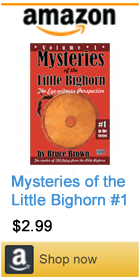
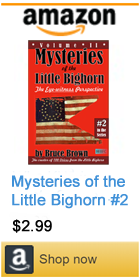
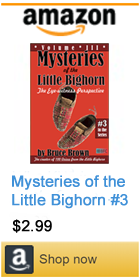
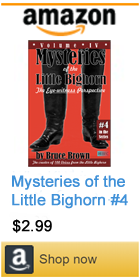

|




 I HAD A NARROW escape at the battle of the Little Bighorn on the 25 & 26 of June and I will endeavor to give you my experience of Indian fighting. At about 10 A.M. on the 25th June, Gen. Custer's scouts returned and reported that they had discovered an Indian village about 15 miles distant, on the Little Bighorn, and that from what they had seen, they supposed the Indians to be retreating before our advance. We continued our march two or three miles farther when a halt was ordered and
I HAD A NARROW escape at the battle of the Little Bighorn on the 25 & 26 of June and I will endeavor to give you my experience of Indian fighting. At about 10 A.M. on the 25th June, Gen. Custer's scouts returned and reported that they had discovered an Indian village about 15 miles distant, on the Little Bighorn, and that from what they had seen, they supposed the Indians to be retreating before our advance. We continued our march two or three miles farther when a halt was ordered and  While thus engaged, I heard a crackling noise near me, which upon investigation I found proceeded from burning wood, the Indians having ignited a fire. The wood being very dry, the fire made rapid headway, and I was forced from my hiding place. I crawled out of the creek bottom the same way I had approached, and as I was about-to ascend the bank, I heard a voice calling "Lieutenant, Lieutenant." I could see no one, but the call was repeated, and advancing a few yards in the direction from which it proceeded, I found all three of the party I had left a short time before, hidden in the bottom of the creek. Mr. Girard told me he had left the horses tied together, where I had seen them, and followed down after me. I found that the party, like myself, was afraid of the progress of the fire; but fortunately for us, the wind subsided, and a little rain fell which, thank God, was sufficient to arrest the flames and revive our hope that we might be able to remain there until night. It was now 3 o'clock P.M.: six more hours to wait, and you may imagine how immensely long we found them. During this time we could hear and often see Indians around us and could hear them talk quite near us. I cannot find words sufficiently expressive to describe my many thoughts during those hours of suspense. * * * Finally the time came when under the protection of night (it was very cloudy) we were able to come out of our hiding places and take the direction of the ford, which was two miles to the south, through an open plain. Mr. Girard and the scout mounted their horses and the soldier and myself took hold, each one, of a horses tail, and followed them. Mr. Girard proposed that, in case he should be obliged to run and leave us, and succeeded in joining the command, he would notify Col. Reno the commander, of my position. During our transit through the open plain we passed many Indians returning to their village and could hear but not see them as the night was very dark. We reached the wood near what we took to be the ford we had passed in the morning, but we were mistaken and had to hunt for the crossing. Once we forded the stream but found it was at a bend and that we would have to ford it again. When we recrossed the river, we ran full into a band of eight savages. The two mounted men ran for their lives, the soldier and myself jumped into the bushes near us. I cocked my revolver and in a kneeling position was ready to fire at the savages if they should approach me. They evidently thought, from the precipitate retreat of the two mounted men, that all of us had decamped; and began to talk among themselves. In a few minutes to my surprise they continued their course, and soon after went out of hearing. I raised up from my position,. approached the bank of the river and called to the soldier, who immediately answered. We then saw that all the fords were well guarded by the savages, and it would be very dangerous to attempt to cross any part of the river. * * * The night passed and in the dim dawn of day we heard an immense tramping, as of a large cavalry command, and the splashing of the water convinced us that some troops were crossing the river. I imagined it was our command, as I could distinctly hear the sound of the horses shoes striking the stones.
While thus engaged, I heard a crackling noise near me, which upon investigation I found proceeded from burning wood, the Indians having ignited a fire. The wood being very dry, the fire made rapid headway, and I was forced from my hiding place. I crawled out of the creek bottom the same way I had approached, and as I was about-to ascend the bank, I heard a voice calling "Lieutenant, Lieutenant." I could see no one, but the call was repeated, and advancing a few yards in the direction from which it proceeded, I found all three of the party I had left a short time before, hidden in the bottom of the creek. Mr. Girard told me he had left the horses tied together, where I had seen them, and followed down after me. I found that the party, like myself, was afraid of the progress of the fire; but fortunately for us, the wind subsided, and a little rain fell which, thank God, was sufficient to arrest the flames and revive our hope that we might be able to remain there until night. It was now 3 o'clock P.M.: six more hours to wait, and you may imagine how immensely long we found them. During this time we could hear and often see Indians around us and could hear them talk quite near us. I cannot find words sufficiently expressive to describe my many thoughts during those hours of suspense. * * * Finally the time came when under the protection of night (it was very cloudy) we were able to come out of our hiding places and take the direction of the ford, which was two miles to the south, through an open plain. Mr. Girard and the scout mounted their horses and the soldier and myself took hold, each one, of a horses tail, and followed them. Mr. Girard proposed that, in case he should be obliged to run and leave us, and succeeded in joining the command, he would notify Col. Reno the commander, of my position. During our transit through the open plain we passed many Indians returning to their village and could hear but not see them as the night was very dark. We reached the wood near what we took to be the ford we had passed in the morning, but we were mistaken and had to hunt for the crossing. Once we forded the stream but found it was at a bend and that we would have to ford it again. When we recrossed the river, we ran full into a band of eight savages. The two mounted men ran for their lives, the soldier and myself jumped into the bushes near us. I cocked my revolver and in a kneeling position was ready to fire at the savages if they should approach me. They evidently thought, from the precipitate retreat of the two mounted men, that all of us had decamped; and began to talk among themselves. In a few minutes to my surprise they continued their course, and soon after went out of hearing. I raised up from my position,. approached the bank of the river and called to the soldier, who immediately answered. We then saw that all the fords were well guarded by the savages, and it would be very dangerous to attempt to cross any part of the river. * * * The night passed and in the dim dawn of day we heard an immense tramping, as of a large cavalry command, and the splashing of the water convinced us that some troops were crossing the river. I imagined it was our command, as I could distinctly hear the sound of the horses shoes striking the stones.  With this conviction I stepped boldly out on the bank and called to Capt. Custer, "Tom, don't leave us here." The distance was only a few yards and my call was answered by an infernal yell and a discharge of 300 or 400 shots. I then discovered my mistake and found the savages were clad in clothes and mounted on horses which they had captured from our men. :Myself and the soldier jumped into the bushes (the bullets mowing down the branches at every volley), and crawled off to get out of range of the fire. In doing so we moved the top branches of the undergrowth, and the Indians on the top of the bluff fired where they saw the commotion and thus covered us with their rifles. [Note: Peter Thompson was also fooled by
With this conviction I stepped boldly out on the bank and called to Capt. Custer, "Tom, don't leave us here." The distance was only a few yards and my call was answered by an infernal yell and a discharge of 300 or 400 shots. I then discovered my mistake and found the savages were clad in clothes and mounted on horses which they had captured from our men. :Myself and the soldier jumped into the bushes (the bullets mowing down the branches at every volley), and crawled off to get out of range of the fire. In doing so we moved the top branches of the undergrowth, and the Indians on the top of the bluff fired where they saw the commotion and thus covered us with their rifles. [Note: Peter Thompson was also fooled by 







